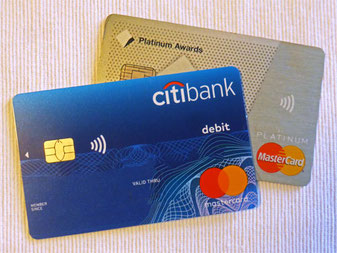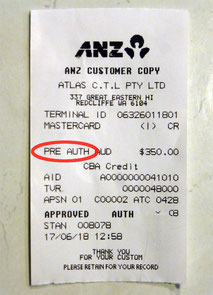Credit cards and security bonds

Credit cards, and to a lesser extent debit cards, are a scourge, because they help to give the power of creating money to the banks; however, they are a useful scourge, and they are just about indispensable when travelling.
Credit or debit cards are not just a convenient way to pay your way when travelling while avoiding the risks of carrying cash and the nuisance of converting currencies; they are also a very efficient way of placing security bonds. Accommodation businesses, car-hire companies, and sometimes other businesses usually require security bonds from you when you use their services.
A security bond is an amount of your money that a business holds to protect themselves against anything that you do that may require them to charge you more money than originally agreed, perhaps because you may have damaged their property, or to cover additional goods and services that you may get from them after making an initial payment.
pre-authorisation
Accommodation businesses and car-hire companies usually take a swipe of your card as a security bond when you arrive or pick up a car, even if they don’t plan to settle with you until you depart or return the car.
When businesses swipe your card for a security bond they do a special sort of transaction called a pre-authorisation. A pre-authorisation takes no money from your card; it just reserves an amount.
This is what the pre-authorisation transaction docket from a recent car-hire security bond looks like, compared to the regular purchase transaction docket for my car-hire charge:


The pre-authorisation transaction will show up on your account as a pending transaction, that is, one that hasn’t yet been completed. If the company doesn’t need to claim any more money from you after you have completed your business with them the pending transaction will disappear from your account, usually within a few days. If the company does need to claim more money from you the transaction will become a normal transaction on your account and it will be on your next statement.
Using a debit card for a security bond
If you use a debit card to place a security bond the amount of the bond will usually be greater than if you used a credit card. For example, I have just placed a security bond of AU$350 using my credit card to hire a car from Atlas Car and Truck Rental; if I had used a debit card the security bond would have been AU$1000. I expect that you would need to have this amount available in your debit card account, or the transaction would be rejected by the bank.
Using cash as a security bond
If you don’t have a credit or debit card, businesses may take a security bond in cash. However, a cash security bond may not be an option – a business may insist on a credit or debit card, or even insist on a credit card. This is because, with a pre-authorisation of your credit or debit card, they have the security of a guarantee that they will be able to take money from your card if they need to.
If you are allowed to pay a security bond with cash, the amount of the bond will usually be much greater than if you are using a credit or debit card, and, for car hire, the car-hire company will probably require you to take out no-excess hire-vehicle excess insurance with them as well. This is because, if you pay the security bond with cash, the business must ensure that it covers your maximum possible liability to them as you use their services.
Credit and debit cards also serve as a limited form of identification for businesses.
Disclaimer
I’ve based this commentary on my personal experiences, circumstances, and impressions, and my limited research on security bonds – it isn’t the result of an exhaustive study of security bonds. It may not apply to you, or your circumstances.
Over time, the things that I say here may become out of date, and, while I’ll correct anything I know is wrong, I’m not going to be excessively conscientious about ensuring that it is current. So, treat this commentary as a great place to start, but do your own research and confirm everything that you read here before using your credit or debit card to place a security bond.
